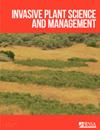波多黎各水葫芦(Eichhornia crassipes)使用草甘膦和去除手控制的案例研究
IF 1.2
4区 生物学
Q3 PLANT SCIENCES
引用次数: 2
摘要
摘要水葫芦[Eichhornia crassipes(Mart.)Solm]是一种广泛分布在波多黎各的水生入侵植物,对河口、淡水湿地、饮用水水库和野生动物保护区产生负面影响。具体而言,热带河口圣胡安湾河口(SJBE)受到了厚脊海鞘的影响。感染导致系统中的水循环减少,并促进了入侵动物的建立。因此,在Laguna San Jose和Peninsula Cantera之间的一个海湾进行了一项实地研究,以评估草甘膦和手动清除作为控制凤眼莲的管理工具的使用情况。还监测了水生大型无脊椎动物和水质,以此作为管理活动对环境影响的衡量标准。结果表明,在施用草甘膦2周后,与未处理的地块相比,处理地块的粗茎海鞘生物量(干重)显著降低至0.27 kg DW m–2,未处理地块的生物量为0.62 kg DW m–2。与草甘膦处理相比,采用手动去除法处理的凤眼莲鲜重下降了90%以上。不同地点的溶解氧和水的pH值没有显著差异;然而,由于潮汐活动,两个地块的盐度都增加到了8-9ppt。水生大型无脊椎动物群落中常见半翅目,其次为Sarcoptiformes。被发现与厚脊灰蝶有亲缘关系并被视为天敌的大型无脊椎动物有:Orthogalumba terebrandtis Wallwork、Niphograpta albigutalis(Warren)和Neochetina eichhorniae Warner。在圣荷西拉古纳使用草甘膦来管理E.crassipes是一种有用的短期控制方法,随着时间的推移,其疗效可能会随着后续应用和手动清除的结合而增强。本文章由计算机程序翻译,如有差异,请以英文原文为准。
A case study of waterhyacinth (Eichhornia crassipes) control in Puerto Rico using glyphosate and hand removal
Abstract Waterhyacinth [Eichhornia crassipes (Mart.) Solm] is an aquatic invasive plant that is widespread in Puerto Rico, where it negatively effects estuaries, freshwater wetlands, potable water reservoirs, and wildlife refuges. Specifically, the tropical estuary San Juan Bay Estuary (SJBE) has been impacted with the presence of E. crassipes. Infestations have led to a reduction of water circulation in the system and have facilitated the establishment of invasive fauna. Therefore, a field study was conducted in a cove between Laguna San Jose and Peninsula Cantera to assess the use of glyphosate and hand removal as a management tool for E. crassipes control. Aquatic macroinvertebrates and water quality were also monitored as a measure of environmental impact due to management activities. Results indicated that at 2 wk after glyphosate application, E. crassipes biomass (dry weight) was significantly reduced to 0.27 kg DW m–2 at the treated plot compared with the nontreated plot, which yielded 0.62 kg DW m–2. Fresh weight of E. crassipes decreased more than 90% when hand removal was used compared with glyphosate treatment. Dissolved oxygen and water pH were not significantly different between sites; however, water salinity increased to 8 to 9 ppt at both plots as a result of tidal activity. The order Hemiptera followed by Sarcoptiformes were common in the aquatic macroinvertebrate community. Macroinvertebrate species found associated with E. crassipes and considered natural enemies were: Orthogalumna terebrantis Wallwork, Niphograpta albigutalis (Warren), and Neochetina eichhorniae Warner. The use of glyphosate to manage E. crassipes at the Laguna San Jose was useful as a short-term control method, and its efficacy may be enhanced over time with follow-up applications in combination with hand removal.
求助全文
通过发布文献求助,成功后即可免费获取论文全文。
去求助
来源期刊

Invasive Plant Science and Management
PLANT SCIENCES-
CiteScore
2.20
自引率
9.10%
发文量
24
审稿时长
6-12 weeks
期刊介绍:
Invasive Plant Science and Management (IPSM) is an online peer-reviewed journal focusing on fundamental and applied research on invasive plant biology, ecology, management, and restoration of invaded non-crop areas, and on other aspects relevant to invasive species, including educational activities and policy issues. Topics include the biology and ecology of invasive plants in rangeland, prairie, pasture, wildland, forestry, riparian, wetland, aquatic, recreational, rights-of-ways, and other non-crop (parks, preserves, natural areas) settings; genetics of invasive plants; social, ecological, and economic impacts of invasive plants and their management; design, efficacy, and integration of control tools; land restoration and rehabilitation; effects of management on soil, air, water, and wildlife; education, extension, and outreach methods and resources; technology and product reports; mapping and remote sensing, inventory and monitoring; technology transfer tools; case study reports; and regulatory issues.
 求助内容:
求助内容: 应助结果提醒方式:
应助结果提醒方式:


